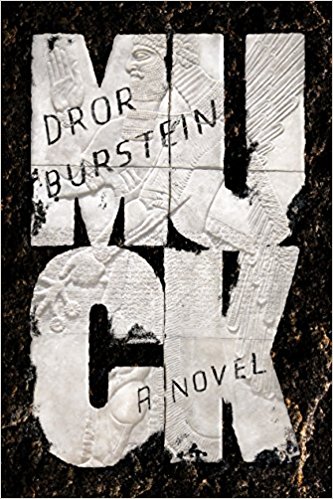
translated by Gabriel Levin
FSG
November 13, 2018
416 pages
grab a copy here or or through your local independent bookstore or library
Originally published in Hebrew in 2016 as טיט, Muck is one of the most original books I’ve read in many years. Slamming together the social, technological, and military circumstances of ancient and modern Jerusalem into a haunting and seamless blend, Burstein retells the Book of Jeremiah masterfully. Kings fly around in helicopters, citizens watch Babylonian armies invading neighboring nations on TV, idols are sold in modern shops. Through it all, Jeremiah, who never asked to be a prophet, tries to warn his family and the larger community that the Jews of Judah will be driven into exile and there’s nothing they can do to stop it.
This question–why prophecy when what’s foretold will happen anyway?–haunts Jeremiah. Only near the end of the book, after he’s been alienated, tortured, and forced into hiding, does he understand that “his fate, his abandonment were never matters of chance, they were the whole point, so that people would be able to see from then on that a prophet had been sent to warn them but to no avail–he was forced to operate on his own, alone, cast out” (388).
Back to the beginning, though. Jeremiah is a struggling poet who wants to critics to write good reviews about his first book. The main critic in town, though, is a bit…intense and beats him with his own keyboard before driving him out into the street. When Jeremiah returns to his parents’ house, though, he notices a new star in the sky–a dead red giant whose light has just reached Earth. It’s then that he dozes and hears a voice telling him that he has been “appointed…a prophet to the nations.” Suddenly, he remembers that a decade before that, he had heard a voice also trying to tell him something, but he had ignored it.
One of the most beautiful aspects of this book (similar to Shimon Adaf’s Sunburnt Faces) is the delicacy and subtlety with which Burstein weaves in the words of the angel who speaks to Jeremiah. Without quotation marks, emerging almost organically from the sentence before, the words of the angel materialize on the page as they do in Jeremiah’s head. He tries to ignore these words once more but finds that he can’t.
Jerusalem at this point is a thriving city, filled with professionals, shops, computers, televisions, and of course the king of Judah and his retinue. Everyone knows that the king of Babylonia (Nebuchadnezzar) is moving on surrounding nations, but they ignore what they hear on the news when it comes to Judah being threatened. Thus begins a long, slow decline, punctuated by King Jehoiakim committing suicide by throwing himself into a stadium-sized bowl of hummus–all because he dreads that Nebuchadnezzar will find out that he stopped paying taxes. King Jehoiakim was already paying taxes to Egypt and…maybe Babylonia wouldn’t notice? But they do, and just as Nebuchadnezzar rolls up to Jerusalem in his black sedan, the king jumps.
His son has been called back to Jerusalem from his life as a classical pianist in Vienna, and this new king (Jehoiachin) readily surrenders to Nebuchadnezzar. As a gesture of mercy (Nebuchadnezzar says), he will only make the professional class come to Babylonia, along with a bunch of treasure. Everyone else can stay. The exiles then board their appointed trains and ride off to make a new life in a new nation. Jeremiah’s parents are among the exiles, as his father is a retired physician. Jehoiachin is appointed the “king in exile” and accompanies these people into Babylonia.
The next in line to the throne is Mattaniah, Jeremiah’s childhood friend and a man who has done everything in his power to distance himself from the royal family. He steps up to become king, though, when it’s clear that no one else can or will. Mattaniah (or Zedekiah, as Nebuchadnezzar calls him) manages Jerusalem’s decline. Royal life has warped his priorities and values, and his attempt to gather up other nations to oppose Nebuchadnezzar (for no discernible reason other than pride) seals Jerusalem’s fate. This time, exile will be total and destruction will reach every corner of the city.
Through all of this, Jeremiah warns his parents, strangers, and anyone who will listen that Judah will fall and bring misery to the Jewish people. Speaking in a Biblical style earns Jeremiah hostile looks but no one believes him. Nonetheless, he does as the angel tells him: buying a jug and destroying it in a public place, burying things in the sand, speaking his prophecy all over the city. We spend a lot of time in Jeremiah’s head, then in Mattaniah’s, and each detail of the city and its decline are detailed patiently and thoroughly. Even minor characters are given center-stage time, if only for a page or two. It’s almost as if Burstein’s narrator is Jeremiah’s angel, able to move around the city and into and out of characters at will, capable of taking everything in.
Gabriel Levin’s skillful translation never once makes you remember that this was originally written in Hebrew–a language totally different from English (Hebrew, you might already know, is written and read from right to left). Like Muck, the Hebrew language itself is the product of the past and the present, with modern Hebrew (as spoken in Israel today) using Biblical Hebrew as its basis.
I highly recommend Muck to all of you reading this review. It’s great if you’re already interested in the history of the Middle East, or Biblical history, but you’ll enjoy this book even if you just love reading beautiful prose. You can thank me later.
